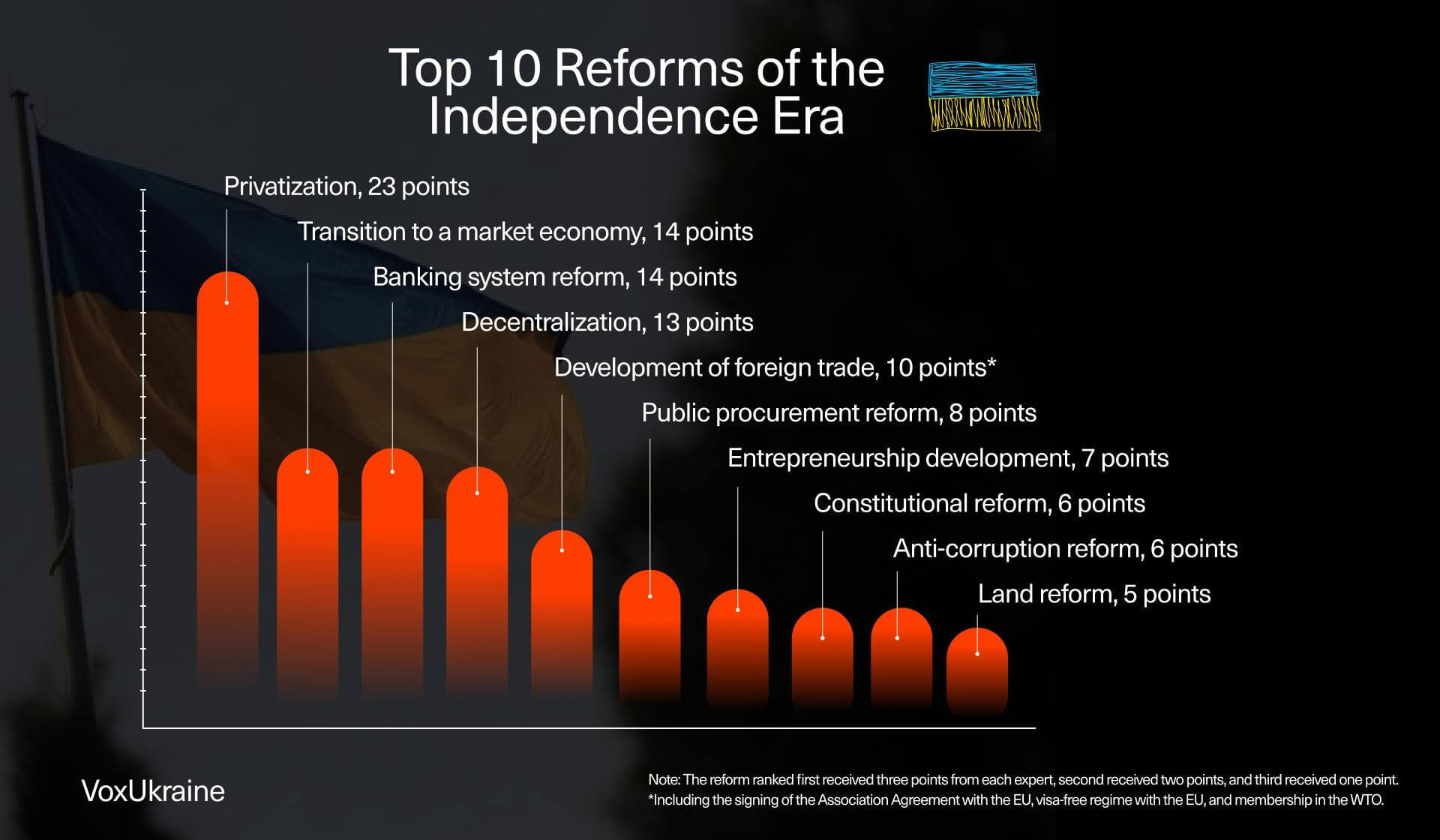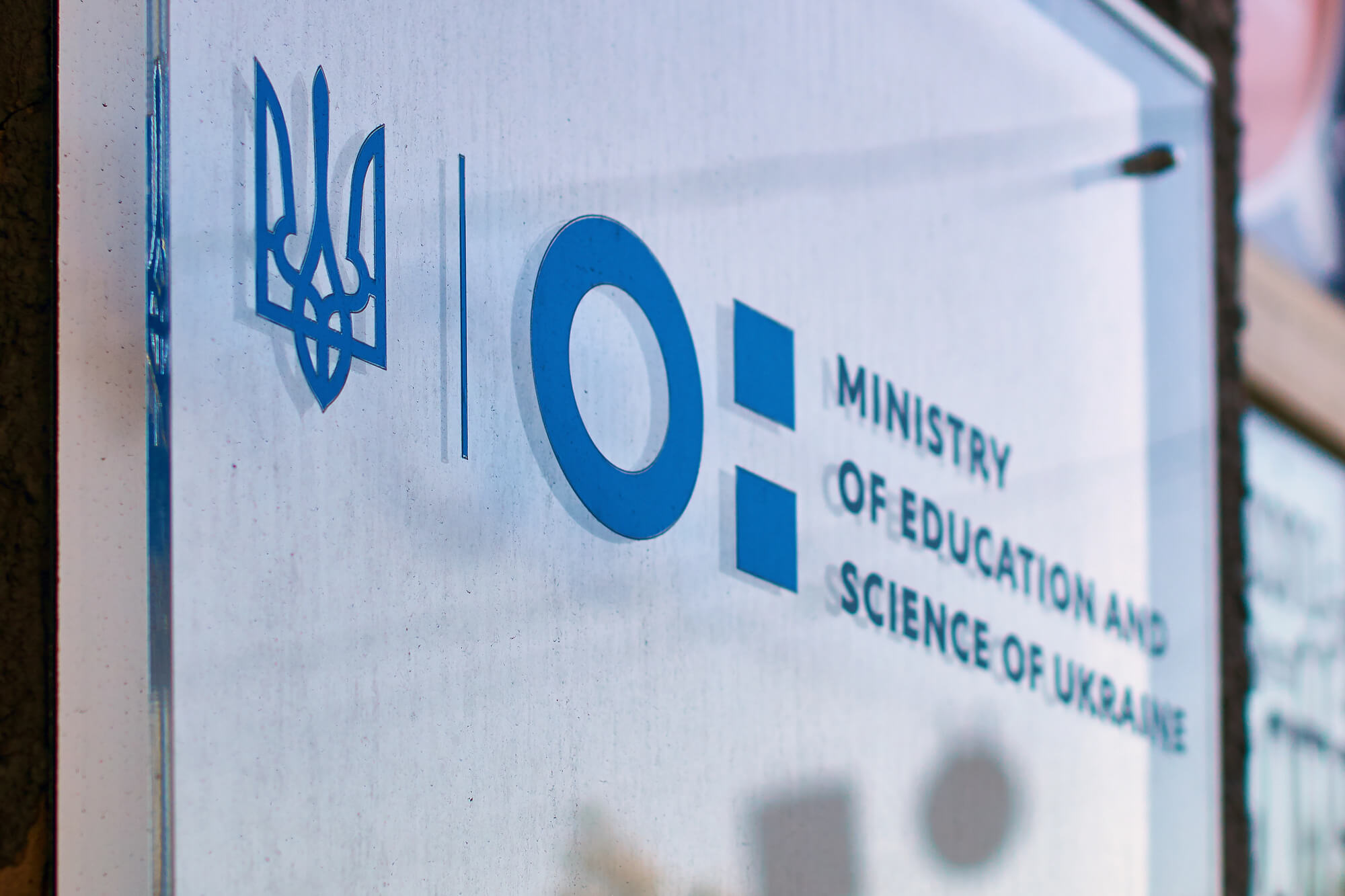According to experts from the Reform Index project, privatization, transition to a market economy, banking system reform, decentralization, and business development have been the main reforms of Ukraine’s independence era. We surveyed the experts on the eve of the anniversary of our state’s independence restoration to highlight and evaluate the significant state-building achievements of the past 32 years.
The majority of experts in their responses mentioned privatization as the most essential reform.
“We’ve transitioned from a 100% state presence in the economy to limiting its role and the leading role of private entrepreneurs,” explained Dmytro Yablonovskyi, an independent consultant in corporate governance, regarding his choice.
“In a broad sense, privatization, including apartments, land, small privatization, and so on, fundamentally changed property relations in Ukraine and made the return of communists impossible. However, property rights remain incomplete as long as the fate of enterprises and entrepreneurs depends on officials’ discretion. Regarding large enterprises, this was largely overcome with the introduction of strict budget constraints (the Yushchenko-Tymoshenko government). However, they remain significantly oligarchized, meaning it influenced growth but not the politico-economic landscape,” commented Volodymyr Dubrovskyi, senior economist at CASE Ukraine.
Mykhailo Demkiv, financial analyst at ICU Group, noted that “the cleansing of the banking sector was painful, but it allowed the banking system to reach a qualitatively new level and withstand the year 2022.”
“The comprehensive reform of the financial sector, ongoing since 2015, already has confirmation of its effectiveness — despite a full-scale war, financial stability has been maintained in Ukraine, and the banking system operates smoothly and fully,” says Olena Korobkova, Chairperson of the Board of the League of Banks of Ukraine.
Ilona Sologub, the scientific editor at VoxUkraine, said, “If the judicial reform had been properly conducted, I would name it because it’s the foundation. However, since 1991, establishing an owner class upon which other economic relations could be developed was the most important thing. And banks are the economy’s circulatory system, so their proper functioning is also very important.”
Even though the judicial reform did not happen properly, experts mentioned it as one with noticeable shifts, along with the anti-corruption reform. Furthermore, positive feedback was given for the public procurement reform, especially the launch of the ProZorro system, the introduction of e-declaration for public servants, and the decentralization reform.
“Decentralization has significantly impacted Ukraine’s resilience in the conditions of full-scale war and has played a certain role in the ‘maturing’ of the population (although, of course, this is a long process),” noted Dmytro Yarovyi, a lecturer at Kyiv School of Economics.
Among other frequently mentioned reforms are the introduction of visa-free travel with the EU and land and healthcare reforms.
“The Association Agreement and the achievement of a visa-free regime with the EU constitute a decade-long reform agenda aimed at liberalizing the economy and integrating into a unified European market, as well as European social and cultural space. It marks a definitive shift in the geopolitical course and a reduction in economic and political dependence on Russia,” emphasized Svitlana Taran, head of the Trade+, International Trade Research Center at KSE.
According to Yaroslav Kudlatskyi, an independent expert, “The healthcare reform is one of the few that introduced competition for patients, led to an improvement in service quality, and directly changed the government’s mechanism of influencing quantitative and qualitative indicators, such as mortality rates, reduced incidence of diseases, and many others, through the implementation of a payment-for-service mechanism.“
“The visa-free regime gives every citizen the opportunity to feel that they are a part of the European community. On the other hand, it’s the EU’s recognition that Ukraine is moving in the right direction, implementing reforms, and upholding its citizens’ fundamental rights and freedoms,” commented Oleh Ivanov, an analyst at VoxUkraine.
“Over the course of 32 years of independence, we’ve achieved a lot indeed. The diversity of reforms mentioned by experts attests to this. I think the most significant thing is that we’ve gained true sovereignty; we make our own decisions and have moved away from Russia’s ‘energy needle.’ But as we move forward, new levels of complexity emerge. Now, Ukraine’s ambitious goal is to become a full member of the EU and NATO. For this, we need to see through the judicial reform, reform of anti-corruption and law enforcement agencies to ensure the rule of law, foster entrepreneurship, and ultimately, the well-being of every Ukrainian,” summarized Kseniia Alekankina, Reform Index project manager at VoxUkraine.
Attention
The authors do not work for, consult to, own shares in or receive funding from any company or organization that would benefit from this article, and have no relevant affiliations




